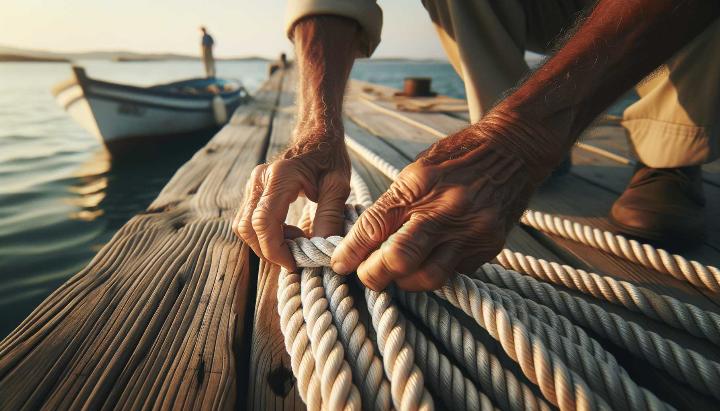Imagine a world where your vessel's security hangs by a thread—or rather, a rope. In the high-stakes game of mooring, the difference between a peaceful night's sleep and a nautical nightmare often comes down to one crucial element: the quality of your mooring rope. Enter the unsung hero of the maritime world: nylon twisted twine.
When it comes to mooring excellence, not all ropes are created equal. This blog post delves into the remarkable world of 3-strand nylon twisted twine, a game-changer in mooring and anchoring applications. Why has this particular rope construction captured the attention of seasoned sailors and industry professionals alike?
From its superior strength-to-weight ratio to its impressive shock absorption capabilities, nylon twisted twine is revolutionising the way we think about vessel security. Whether you're a weekend boating enthusiast or a commercial fleet manager, understanding the nuances of this versatile material could be the key to elevating your mooring strategy.
Join us as we unravel the twisted tale of nylon twine, exploring its unique properties, diverse applications, and why it might just be the smartest investment you'll make for your maritime adventures. Prepare to be surprised, enlightened, and perhaps even a little excited about rope—yes, you read that right. Let's dive in!
Understanding Nylon Twisted Twine: Properties and Applications
When it comes to mooring excellence, understanding the materials at your disposal is crucial. Nylon twisted twine has emerged as a go-to choice for many marine enthusiasts and professionals alike. Let's dive into what makes this versatile material so special.
Composition and Manufacturing of Nylon Twisted Twine
Nylon twisted twine is crafted from 100% nylon fibers, carefully twisted together to create a strong and durable rope. The manufacturing process involves spinning multiple strands of nylon into a tight, cohesive cord. This twisting technique not only adds strength but also helps reduce stretching, making it ideal for mooring applications.
As I ran my fingers along a length of nylon twisted twine recently, I was struck by its smooth yet sturdy texture. It's this unique feel that hints at its impressive capabilities in marine environments.

Strength and Durability Characteristics
One of the most impressive features of nylon twisted twine is its remarkable strength-to-weight ratio. Did you know that this type of twine can stretch 15-28% at breaking point? This elasticity is a game-changer in mooring situations, providing crucial shock absorption capabilities.
- Abrasion resistance: Nylon twisted twine holds up exceptionally well against wear and tear, outlasting many traditional rope materials.
- Chemical resistance: It maintains its integrity even when exposed to various chemicals, making it suitable for diverse marine environments.
- UV resistance: Long days under the sun won't compromise its strength, ensuring longevity in outdoor applications.
Common Uses and Industry Applications
While we're focusing on mooring applications, it's worth noting that nylon twisted twine's versatility extends far beyond the marina. From netmaking to construction, this material finds its way into numerous industries.
In the marine world, you'll find nylon twisted twine used for:
- Anchor lines: Providing reliable holding power with its stretch properties.
- Mooring lines: Offering the perfect balance of strength and flexibility.
- Fender ties: Ensuring your vessel stays protected at the dock.
When selecting nylon twisted twine for your mooring needs, consider the thickness options available. They typically range from #18 (1.52 mm) to #72 (3.17 mm), allowing you to choose the perfect size for your specific requirements.
Have you considered using tarred nylon twine for added protection? This variant comes with a protective coating, further enhancing its durability in harsh marine conditions.
As we wrap up this section, it's clear that nylon twisted twine offers a compelling combination of strength, durability, and versatility. Its unique properties make it an excellent choice for mooring applications, providing peace of mind for boat owners and marina operators alike. In the next section, we'll delve deeper into the specific benefits of using twisted nylon twine in mooring setups, so stay tuned!
Benefits of Twisted Nylon Twine in Mooring Applications
When it comes to securing your vessel, the choice of mooring line can make all the difference between a peaceful night's sleep and a nerve-wracking ordeal. Twisted nylon twine has become a favourite among seasoned sailors and marina managers alike, and for good reason. Let's dive into the remarkable benefits this versatile material offers for mooring applications.
Shock Absorption and Elasticity Advantages
One of the standout features of twisted nylon twine is its impressive elasticity. As I discovered during a particularly choppy day at the harbour, this elasticity is a game-changer when it comes to absorbing shock loads.
- Superior shock absorption: Nylon's ability to stretch up to 30% of its length allows it to absorb sudden jerks and pulls, protecting both your vessel and the mooring point from damage.
- Energy dissipation: The twine's elasticity helps dissipate energy from waves and wind, reducing stress on your boat's cleats and hardware.
- Bounce-back capability: Unlike some materials that deform under stress, nylon twine returns to its original length after stretching, maintaining its effectiveness over time.
I once witnessed a fibreglass boat moored with a non-elastic line during a storm. The constant jerking caused by the waves nearly pulled out the boat's cleats. It was a stark reminder of why shock absorption is crucial in mooring applications.
Durability and Performance in Marine Environments
The marine environment can be unforgiving, but twisted nylon twine stands up to the challenge admirably. Its durability in harsh conditions is a testament to its quality and design.

Here's why twisted nylon twine outperforms many traditional ropes in marine settings:
- Exceptional abrasion resistance: The twisted construction helps distribute wear evenly, prolonging the life of your mooring lines.
- UV resistance: Nylon's natural resistance to UV degradation means your lines won't weaken prematurely under the harsh sun.
- Chemical resilience: Whether it's saltwater or the occasional fuel spill, nylon twine holds up well against chemical exposure.
- Impressive strength-to-weight ratio: You get robust holding power without the bulk, making handling and storage a breeze.
Have you ever tried to handle a waterlogged natural fibre rope? It's a heavy, cumbersome affair. In contrast, nylon twine remains lightweight even when wet, making it much easier to manage during docking or when adjusting your mooring setup.
While twisted nylon twine offers numerous advantages, it's worth noting that it may require more frequent inspection due to its stretch properties. However, this minor maintenance need is far outweighed by its superior performance and longevity in mooring applications.
As we've seen, the benefits of using twisted nylon twine for mooring are clear. Its combination of shock absorption, durability, and ease of handling make it an excellent choice for both recreational boaters and commercial marine operations. Next time you're selecting mooring lines, consider the peace of mind that comes with choosing a material designed to withstand the rigours of marine life. For more detailed options on nylon twisted rope applications, be certain to explore related articles.
Exploring the Versatility of Twisted Twine in Mooring Setups
As we dive deeper into the world of mooring excellence, it's crucial to understand the remarkable versatility of twisted twine in various mooring setups. From small pleasure craft to large commercial vessels, twisted nylon twine has proven its worth across a wide spectrum of marine applications. Let's explore how this adaptable material shines in different mooring scenarios.
Types of Mooring Ropes and Their Properties
Before we delve into the specific advantages of twisted twine, it's worth comparing it to other common mooring rope materials:
- Nylon: Offers excellent elasticity and shock absorption, ideal for dynamic mooring conditions.
- Polyester: Provides good strength with minimal stretch, suitable for more static mooring situations.
- Polypropylene: Lightweight and floats on water, often used in temporary mooring setups.
Among these options, twisted nylon twine stands out for its unique combination of strength, elasticity, and durability. The twisted construction enhances its performance, distributing load evenly and improving its resistance to abrasion.

Advantages of Twisted Twine for Anchoring
When it comes to anchoring, twisted nylon twine truly shines. Its elasticity allows it to absorb shock loads from waves and wind, reducing stress on both the vessel and the anchor. This property is particularly valuable in areas with changing tides or unpredictable weather conditions.
I once witnessed a small fishing boat weather a sudden squall thanks to its twisted nylon anchor rode. The rope's ability to stretch and absorb the energy of the waves kept the anchor firmly set, while boats with less elastic lines struggled to maintain their position.
- Superior shock absorption: Protects your vessel and anchor from sudden jerks and pulls.
- Excellent holding power: The twisted construction provides a firm grip on the anchor, enhancing overall security.
- Versatility in different bottom conditions: Performs well on various seafloor types, from sandy to rocky bottoms.
Many experienced sailors swear by the three-strand twisted nylon construction for their anchor rodes. This design offers an optimal balance of strength, flexibility, and ease of handling. Have you considered upgrading your anchor line to twisted nylon twine? Discover more about the benefits of nylon in mooring with our Nylon Mooring Rope guide.
The versatility of twisted nylon twine extends beyond its material properties. Its compatibility with various mooring hardware and accessories makes it a go-to choice for both recreational boaters and commercial operators. From cleats and bollards to fairleads and chocks, twisted nylon twine works seamlessly with a wide range of mooring equipment.
Moreover, the customisation options available with twisted nylon twine are impressive. Manufacturers can adjust the thickness, length, and even add special coatings to meet specific mooring requirements. This flexibility allows boat owners to tailor their mooring setups to their unique needs and local conditions.
When considering the long-term value of your mooring setup, twisted nylon twine offers an excellent balance of performance and cost-effectiveness. Its durability and resistance to wear mean fewer replacements over time, saving you money and hassle in the long run.
As we wrap up this exploration of twisted twine's versatility in mooring setups, it's clear that its adaptability and performance make it a standout choice for a wide range of marine applications. Whether you're securing a small dinghy or a large yacht, twisted nylon twine provides the reliability and flexibility needed for safe and effective mooring.
Nylon twisted twine stands out as a superior choice in mooring applications, offering unmatched strength, elasticity, and resistance to harsh marine conditions. This durable material, with its robust abrasion and UV resistance, ensures long-lasting performance, making it ideal for a variety of vessels. The twisted nylon twine's ability to absorb shock protects both the boat and anchors, providing peace of mind in fluctuating sea conditions. Its versatility allows for seamless integration with mooring hardware, proving its cost-effectiveness and reliability. Embrace the excellence of twisted twine for your mooring needs and experience enhanced security and stability.
Ready for Enhanced Mooring? Inquire Now!
Fill in the form above to learn more about nylon twisted twine and how it can improve your mooring setups. Our specialists are ready to assist with tailored solutions that meet your exact needs.